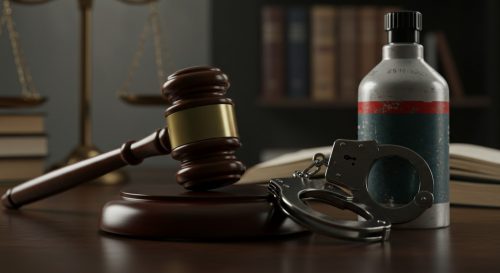Navigating Legal Challenges: The Importance of Consulting a Solicitor if Caught with Laughing Gas in England

Navigating Legal Challenges: The Importance of Consulting a Solicitor if Caught with Laughing Gas in England
In recent years, the use of nitrous oxide, commonly known as laughing gas, has seen a notable increase in England. This trend, however, has brought with it legal ramifications that must be understood and navigated carefully. If you find yourself in a situation where you have been caught with laughing gas, contacting a solicitor should be your immediate priority.
Understanding the Legal Landscape

In England, the legal status of nitrous oxide is governed by the Psychoactive Substances Act 2016. This law primarily targets the sale and distribution of psychoactive substances, including laughing gas, for recreational use.
It’s crucial to note that while the use of nitrous oxide is not directly illegal, the act of supplying, possessing with intent to supply, producing, or importing nitrous oxide for human consumption can lead to legal complications.
The legislation aims to curb the misuse of this substance due to its psychoactive effects.
A solicitor with expertise in this area can interpret these laws for you, providing insights into potential penalties, which could range from fines to imprisonment, and help you understand the legal thresholds for what constitutes ‘supply’ or ‘intent to supply.’
The Ambiguity of the Law
The legal intricacies surrounding nitrous oxide stem from its dual use. Apart from being a recreational drug, it’s also widely used in medical and culinary contexts. For instance, in the medical field, it serves as an anaesthetic, and in the culinary industry, it’s used in whipped cream chargers.
Therefore, possession of laughing gas is not inherently illegal. A skilled solicitor can navigate these nuances, helping to establish the context of your possession, whether it’s for legitimate use or otherwise, which can significantly impact the outcome of your case.
The Consequences of Conviction
A conviction for offences related to psychoactive substances like nitrous oxide carries significant ramifications. Beyond immediate penalties like fines or imprisonment, it can have far-reaching consequences on your life.
This includes hindering future employment prospects, especially in fields requiring background checks, and restricting international travel, as some countries deny entry to individuals with drug convictions. A solicitor can work to minimise these long-term impacts, either by working towards a dismissal of charges or securing a more lenient sentence.
Navigating the Court System

The English court system, with its intricate procedures and protocols, can be overwhelming. A solicitor serves as your navigator, guiding you through each stage – from police interviews, where your initial response can significantly influence your case, to court appearances.
They ensure your rights are upheld, including the right to remain silent or to avoid self-incrimination, and they can communicate on your behalf, effectively articulating your defence.
Potential Defences
Each case of nitrous oxide possession or distribution is unique, and various defences might be applicable. A solicitor will analyse the specifics of your case, including how the substance was obtained, the intended use, and the quantity involved.
Potential defences might include proving the substance was intended for legitimate use, challenging the prosecution’s evidence on technical grounds, or arguing a lack of knowledge or intent. An experienced solicitor can identify the most suitable defence strategy and implement it effectively.
Importance of Specialised Legal Advice
Given the complex nature of drug legislation, including laws around psychoactive substances, specialised legal advice is indispensable. Solicitors with experience in drug-related laws are more adept at navigating these cases, understanding the latest legal precedents, and employing sophisticated arguments that could be crucial for your defence.
They bring a depth of knowledge that general legal practitioners may not possess.
Avoiding Self-Incrimination

One of the immediate risks after being caught with a substance like laughing gas is self-incrimination. The right legal advice is crucial at this stage. A solicitor can advise you on how to handle police questioning, ensuring you do not make statements that could be detrimental to your case.
They also guide you on your right to silence, ensuring you don’t provide any information that the prosecution could use against you.
Understanding Your Rights
Many individuals are unaware of their legal rights when caught with substances like nitrous oxide. A solicitor ensures you are fully informed of your rights, such as the right to legal representation and the right to avoid self-incrimination.
Understanding these rights can profoundly impact the outcome of your case and ensure that the legal process is fair.
Peace of Mind
Facing legal charges can be a highly stressful experience. Having a solicitor by your side provides a sense of security and confidence. Knowing that an expert is handling your case alleviates the stress and anxiety associated with legal proceedings.
This peace of mind is invaluable, allowing you to focus on other aspects of your life while the solicitor manages your case.
Conclusion: Aftermath of Being Caught with Laughing Gas in England

In summary, the legalities surrounding nitrous oxide in England are intricate and navigating them without professional legal assistance can be perilous. Contacting a solicitor immediately if you’re caught with laughing gas is not just advisable; it’s imperative.
Their expertise, guidance, and representation are critical in safeguarding your rights, understanding the complexities of the law, and achieving the best possible outcome in your case. Remember, the implications of a drug-related offence are serious and far-reaching, making professional legal advice not just a resource but a necessity.
Notice: Informational Content Disclaimer
The content provided on this website, including articles, blog posts, and other informational materials, is intended for general informational purposes only. It is not intended as, and should not be considered, legal advice.
Visitors to this website should be aware that the information presented here is not a substitute for seeking legal advice from a qualified solicitor or legal professional. Each individual's legal situation is unique, and the information provided may not be applicable to specific circumstances.
If you require legal advice or have specific legal questions, we encourage you to contact us directly. Our experienced team of solicitors is here to assist you with your legal needs and provide tailored advice to address your concerns.
Please be advised that any communication through this website, including the use of contact forms or email, does not create a solicitor-client relationship. Confidential or time-sensitive information should not be sent through this website. To establish a solicitor-client relationship and discuss your legal matters in detail, please contact us for a consultation.
We strive to provide accurate and up-to-date information, but we make no representations or warranties regarding the accuracy, completeness, or suitability of the information contained on this website. We shall not be liable for any reliance placed on the information provided herein.
Thank you for visiting our website. We look forward to the opportunity to assist you with your legal needs.




